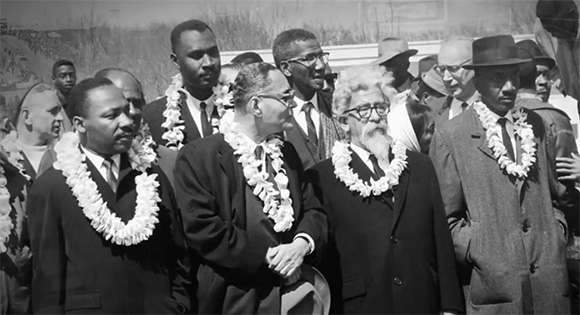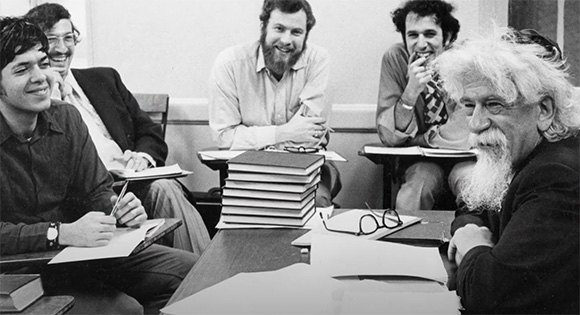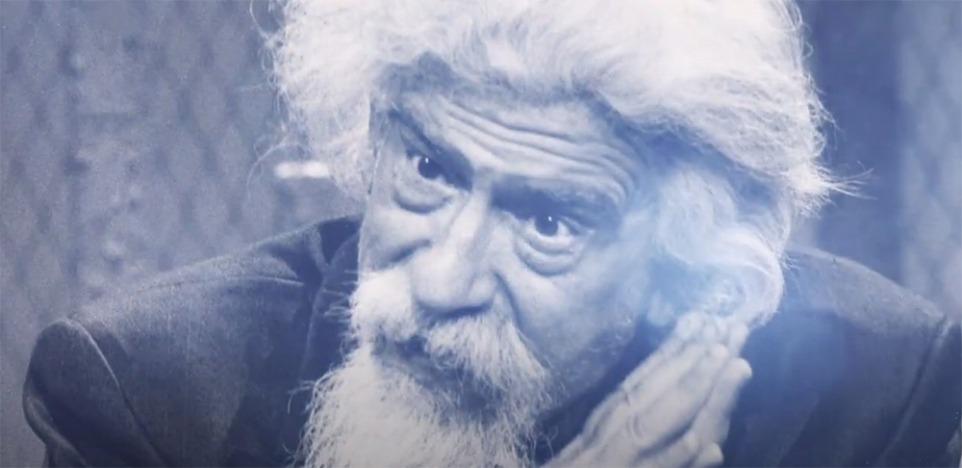Spiritual Audacity: The Abraham Joshua Heschel Story is streaming from some PBS stations and is also available on DVD.
In the Hebrew Bible, a prophet was not simply a person who predicted the future, as the term has come to be widely used, but rather a truth-teller about the present, one who saw the way the world truly was and was moved to call others to dismantle its status quos and injustices. Twentieth century faith leader Rabbi Abraham Joshua Heschel was such a prophet, and Martin Doblmeier’s brief but powerful documentary Spiritual Audacity: The Abraham Joshua Heschel Story makes that truth exceedingly clear.
Born in Poland in 1907, Heschel saw some of the most devastating and galvanizing moments in recent history unfold before him and, as evidenced by his thoughtful writings and speeches, many of which are excerpted throughout Doblmeier’s film, witnessing these events without participation in them was not an option. As other faith leaders situated themselves idly on the sidelines during the Holocaust, the Vietnam War, and the civil rights and racial justice movements in the United States, Heschel believed that true embodiment of faith meant action. In one of his most famous quotations, taken from a reflection on his time marching in Selma, Alabama, with the Rev. Dr. Martin Luther King, Jr., Heschel proclaimed, “I felt like my legs were praying.” These profoundly simple words encapsulate the core of Heschel’s theology, one in which God’s work in the world requires co-creation with human beings if it is to have any effect at all.
Over the course of 57 brisk minutes, Doblmeier utilizes archival photos and footage, sound clips, and contributions from several Heschel-inspired spiritual luminaries to chart the arc of this prophet’s life and legacy. The film lays the foundation for his faith in his Hasidic upbringing, shows how loss and love shaped his increasingly controversial social justice stances,and climaxes with his march of solidarity with King and his contemporaries.

It also gives voice to those who, in the wake of his death, continue to honor his legacy through their own continuing prophetic work. Among the lively talking heads included are activists, politicians, faith leaders, academics, and historians, including John Lewis, Jesse Jackson, Sharon Brous, Andrew Young, Taylor Branch, Walter Brueggemann, Cornel West, Michael Lerner, Arnold Eisen, and Heschel’s own daughter Dr. Susannah Heschel, who is herself a professor of Jewish Studies. Doeblmeier deftly intercuts these interviews from the present with well-curated offerings from the past, showing how ahead of his time and of-the-moment Heschel truly was and remains.
Heschel’s gift for punchy and inspiring language is laced throughout, most notably in the quotation from which the film’s title springs, a line from a characteristically loaded telegram he sent to President John F. Kennedy in the 1960s, urging him to take the increasingly loud cries for racial justice more seriously; it’s one that could have been written yesterday: “I propose that you, Mr. President, declare a state of moral emergency. The hour calls for moral grandeur and spiritual audacity.”

Another of Heschel’s powerful terms, “radical amazement,” connects his fervent belief in the call for justice in the world to the awe and wonder he believed all humans should feel in the presence of a God who empowers us to pursue that justice. For him, it is not enough to be amazed or enraged; human response to the beautiful and the brutal is required and desired by God. If Heschel were merely a talented wordsmith, it would be enough to spark admiration, but the fact that he supported his erudite articulation with unwavering action makes him one of the most meaningful models for anyone aspiring to not only name the world’s problems but also commit to becoming the change they hope to see.
Every moral movement to which Heschel devoted himself continues today. Black bodies and lives are still devalued and destroyed by white supremacist infrastructures and systems. Anti-semitism is on the rise. The Military Industrial Complex continues to devour resources while the money spent on violence could be so much better utilized in creating actual economic justice. Thankfully, the spiritual audacity, moral grandeur, and radical amazement that Heschel espoused and exemplified has sown seeds that still nurture countless continuing faith-based justice movements. As an easily digestible introduction to the legacy of this truth-teller, Spiritual Audacity succeeds, but the true proof of its power will be evident in the viewers it inspires to absorb the lessons of the past, read the present writing on the wall, and commit to carrying the work that remains to be done far into the future.
